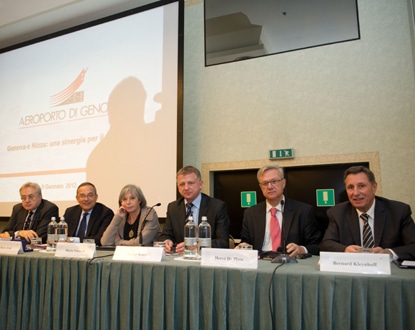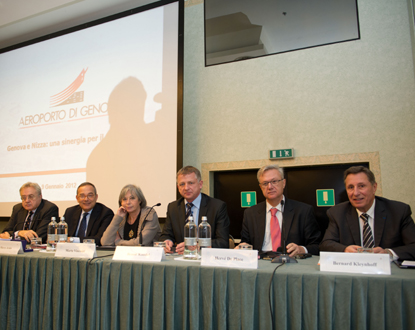It is well-known that Christian Estrosi has little sympathy for anything related, even remotely, to Marseille and the Provence-Alpes-Côte d’Azur Region (PACA). Beyond the reasons of some and the faults of others, it must be acknowledged that the relations are “at a minimum,” or even downright in political and personal opposition.
 Examples are not lacking; on the contrary, there are few cases that do not become subjects of controversy and radical positioning in terms of confrontation.
Examples are not lacking; on the contrary, there are few cases that do not become subjects of controversy and radical positioning in terms of confrontation.
If one cannot go west, then the only option is to turn around and look east.
This is the new strategy of the Mayor of Nice and President of the Nice Côte d’Azur Metropolitan Area, a strategy that began with an agreement with the Municipality of Genoa (primarily based on rail and maritime transport and collaboration, even integration, between port and airport activities—see the article below).
But as the saying goes, appetite grows with eating, so why stop there?
A new front will open in the near future: a relationship with Turin, this time more focused on university education and research, areas where the Piedmontese city is internationally recognized (its Politecnico* was recently ranked first by the Italian Ministry of Universities and Research with a score of 19.20/20). A meeting with the Mayor of Turin, Piero Fassino, is already scheduled during an invitation at the Nice Carnival (17 February).
A note accompanies these alliances: Nice-Genoa, Turin… Wasn’t this the historical territory of the former Kingdom of Piedmont, a stronghold of the House of Savoy?
Is history not an eternal return?
Nice Premium correctly predicted this in its articles from 14 February and 4 August of last year. This time, it has become a reality.
By signing a cooperation protocol with the Genoa Airport yesterday, the Nice Côte d’Azur Airport wants to emphasize the importance it places on developing its regional anchorage as part of an Alpes-Mediterranean euro-region and, through concrete work axes, strengthen its exchanges with the Genoa Airport.
The historical ties, geographical proximity, and complementarity of these airports, both in terms of their destinations and their motivating objectives, have naturally driven the two entities to establish an active collaboration through three major development axes.
- Create inter-airport shuttle buses (Genoa – Albenga – Nice). These shuttles will be dedicated to the traffic of air passengers, who can use them in both directions. They will also facilitate access to the Port of Genoa for the many cruise passengers arriving by plane to Nice.
- Encourage the creation of double-touch routes for leisure, medium, or long-haul flights,
- Develop a synergy in the field of business aviation to offer Genoa a complementary offer to Nice and Cannes Mandelieu, especially during peak periods.
Hervé de Place, President of the Executive Board of Aéroports de la Côte d’Azur, states:
“We are pleased with the signing of this protocol, which is a continuation of our shared historical past with our Italian neighbors and which will strengthen our exchanges in air transport. More than ever, we must unite our efforts to be more attractive to both leisure and business clients and thus jointly develop our competitive advantages in an increasingly competitive international market.”
Bernard Kleynhoff, President of the Supervisory Board of Aéroports de la Côte d’Azur, concludes:
“This cooperation agreement is yet another example of pooling our expertise. The Côte d’Azur is committed to intensive collaboration with its Italian neighbors in the Piedmont and Liguria regions. High-Speed Line, tourism, boating, education, innovation… Our territorial and entrepreneurial themes converge. The Côte d’Azur is resolutely engaged in this path and knows it can find strong allies among its Italian partners. This type of cooperation allows us to stand united and proactively embrace the European Union’s initiatives for the economic development of our regions.”
On his side, Marco Arato, president of the Genoese company, expressed his full satisfaction: “I can assure you this is not your usual dream book.”
The volume of activity at the Genoese airport was 1.4 million passengers in 2011. The lack of ‘critical mass’ prohibits its development towards the international realm, and this collaboration can only be particularly beneficial for it.
The company is undergoing privatization, and among the candidates shortlisted is a company from the Vinci group (Vinci Airport, which already manages some regional airports in France and Vietnam).
“Although this agreement has no capitalistic vocation, it is not excluded that, as part of this operation, the Nice Airport could take a very minority stake in the new shareholding,” says Bernard Kleinhoff.



